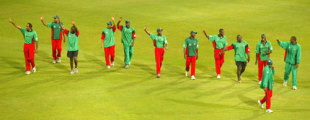|
|
|

Kenya take a lap of honour after their semi-final defeat at the 2003 World Cup
© Getty Images
|
|
| |
The Associates are up in arms over proposals to reduce their number from six to four at the 2011 World Cup.
The move comes as organisers try to make the tournament less prone to early upsets - the early eliminations of India and Pakistan in 2007 were financially crippling - as well as giving the bigger teams more matches in the early stages.
The favoured format for 2011 is in effect a reversion to the one used in South Africa in 2003 where in the first round there were two groups of seven teams, with the top three in each group progressing to the Super Sixes. It was heavily criticised at the time for being too long, but more matches mean more revenue and that is a priority for both the ICC and the tournament organisers.
The main flaw of the 2003 event was that the Super Sixes was rendered almost pointless because of the way points were carried forward from the first round, and it remains to be seen if that will be addressed. The length of the last two World Cups have also been attacked, but it is hard to see with a reversion to the 2003 format how much time can be trimmed from the eight-week event.
The reduction from 16 to 14 teams means the Associates will lose two of their slots as Full Members, including Bangladesh and Zimbabwe, are guaranteed participation. The move is believed to have come from India and Pakistan, and with guaranteed support from Bangladesh, Sri Lanka and Zimbabwe, it is likely to happen.
Privately, the ICC is believed to be split. Some senior officials are keen to retain as many Associates as possible to keep the World Cup a global event, but its commercial arm is thought to back a reduction in participants.
Last week eight of the leading Associates wrote to Malcolm Speed, the ICC chief executive, registering their deep concern with the proposals. "We would regard such a step as perverse and unwarranted," the letter said. "It would be wholly contrary to the best interests of cricket and to the spirit of the game and [its] globalisation."
| |
|
|
|
| |
| The Associates' argument is a reduction in the number of sides goes against the stated aim of expanding the game into new areas. However, some leading Full Members question the value of that policy and would prefer an acceptance that cricket will never really expand outside its traditional homelands |
| |
Their argument is a reduction in the number of sides goes against the stated aim of expanding the game into new areas. However, Cricinfo has learnt that some leading Full Members question the value of that policy and would prefer an acceptance that cricket will never really expand outside its traditional homelands.
Those advocating the reduction say the Associates rarely shine at World Cups and that there is no strength in depth. While Ireland qualified for the Super Eights in 2007, the performance of other sides such as Bermuda and Canada was poor. And Kenya's progression to the semi-finals in 2003 was as much due to boycotts and a skewed format than anything else. It would be better, so the argument goes, to have the best four Associates playing six games than six playing three, as was the case in 2007.
The majority of the Associates most likely to be affected are meeting in London this week to discuss how they can tackle the proposals. The reality, however, is that they know only too well that if the major countries want to force the changes, there is little they can do about it.
Martin Williamson is executive editor of Cricinfo
